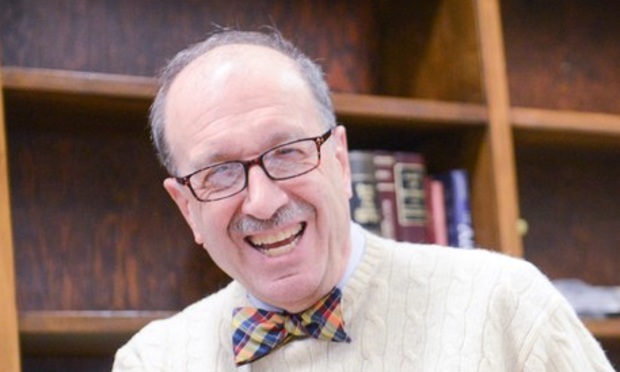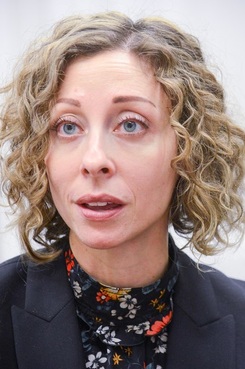Justice Charles Ramos, Retired From Commercial Division, Launches ADR Firm With Former Clerk
Ramos—who says he disposed of 14,000 matters, including 10,000 commercial cases, in a 35-year judicial career—and his former principal clerk view the firm as a means of continuing, and capitalizing on, a “tag-team” method developed over the years that they say efficiently helped many parties resolve long-lasting and expensive cases.
February 22, 2019 at 05:41 PM
5 minute read
 Justice Charles Ramos, recently retired from the New York State Supreme Court, has started an alternative dispute resolution business with Orna Artal, his former principal law clerk. (Photo: David Handschuh/ALM)
Justice Charles Ramos, recently retired from the New York State Supreme Court, has started an alternative dispute resolution business with Orna Artal, his former principal law clerk. (Photo: David Handschuh/ALM)
Pointing to more than a decade of experience in resolving complex business disputes inside chambers through negotiation, newly retired Manhattan Supreme Court Commercial Division Justice Charles Ramos and his former law clerk have launched their own mediation and arbitration firm.
Ramos—who says he disposed of 14,000 matters, including 10,000 commercial cases, in a 35-year judicial career—and his former principal clerk view the firm as a means of continuing, and capitalizing on, a “tag-team” method developed over the years that they say efficiently helped many parties resolve long-lasting and expensive cases.
“I think what we're doing is we're trying to duplicate what we did in court,” Ramos said in a recent interview at his post-retirement chambers inside the Manhattan Supreme Court courthouse, where he will still work on certain active Commercial Division cases as a Judicial Hearing Officer.
 Orna Artal (Photo: David Handschuh/ALM)
Orna Artal (Photo: David Handschuh/ALM)The goal of the two-person firm, said both Ramos and former principal law clerk Orna Artal, will be to help parties preserve business relationships by getting them out of entrenched, often bitter litigation.
When acting as Ramos' assistant law clerk, from 2005 to 2008, and then principal law clerk until Ramos' December retirement, Artal and Ramos would often “build a wall” between them in the earlier stages of commercial suits that flooded Ramos' chambers as a senior judge in Manhattan Supreme Court's Commercial Division.
Artal would act as the “good cop” and try to effectively mediate and settle disputes in an effort to both help the parties and clear the docket, they said. Ramos would not take part in those discussions. But if progress couldn't be made, he would often enter the discussions to use both his legal expertise and authority to try and resolve the case outside of the courtroom.
“Good cop, bad cop, it's worked,” Ramos said. “We must have this incredible record of being efficient” in resolving cases, he added.
He explained that he liked to stay away from the early, mediation-type talks, because “it could affect my thinking of the case, and they [the parties] might not be as candid with her [Artal] as they might be” if he were on hand.
The Ramos and Artal business comes at around the same time—early this year—that nine former New York Court of Appeals and appellate judges have begun offering their services as arbitrators in commercial cases as part of a joint venture. That network, founded by retired Appellate Division, First Department Justices David Saxe and James Catterson, has said it is unique because everyone in it has appellate and trial experience.
Ramos also said that another goal of his and Artal's firm will be to keep costs for parties down, through being a small outfit offering both mediation and arbitration services.
Artal explained that “most arbitrators won't provide mediation services, because you're conflicted. How can you arbitrate a case when you're mediating it?” But she said that she and Ramos will continue to use a wall between them whenever necessary.
“We want it to be a true alternative to litigation,” said Ramos, while noting that he is certified as an international arbitrator. “These days the big complaint from parties in these cases is that arbitration has become as expensive as litigation.”
He added, while contrasting his and Artal's firm to large, established organizations offering ADR services such as the American Arbitration Association and JAMS, “I like the idea of having something that is efficient, inexpensive and not overly bureaucratic.”
“We see a need for it,” said Artal, chiming in. Complex commercial litigation, she said, “is so costly for a business dispute, and it can be a very inefficient means of resolving a dispute if the parties want to preserve a business relationship.”
“Litigation can destroy that, because of the amount of time involved and the bitterness that can affect the process,” she added.
Asked about the pricing structure of the new venture, called simply Ramos & Artal LLC, the retired judge said only that it will be a “negotiated price,” and that he and Artal will often try to base the price on the “worth” of the case, meaning how much money is at stake in the dispute.
“We want to keep the door open to anybody,” he added, “without concern of very high filing fees, because some of the big organizations and institutions, you have to pay a lot up front”
As for how the outfit will attract business, Ramos said that he believed, at first, “it's going to be slow—what we're going to do is going to depend on word of mouth, more than anything else.”
He added that he and Artal work well together and have long thought of starting an ADR firm. “We love it,” he said, referring to using ADR to end disputes.
This content has been archived. It is available through our partners, LexisNexis® and Bloomberg Law.
To view this content, please continue to their sites.
Not a Lexis Subscriber?
Subscribe Now
Not a Bloomberg Law Subscriber?
Subscribe Now
NOT FOR REPRINT
© 2025 ALM Global, LLC, All Rights Reserved. Request academic re-use from www.copyright.com. All other uses, submit a request to [email protected]. For more information visit Asset & Logo Licensing.
You Might Like
View All
Orrick Hires Longtime Weil Partner as New Head of Antitrust Litigation

Ephemeral Messaging Going Into 2025:The Messages May Vanish But Not The Preservation Obligations
5 minute read

SEC Official Hints at More Restraint With Industry Bars, Less With Wells Meetings
4 minute readTrending Stories
Who Got The Work
J. Brugh Lower of Gibbons has entered an appearance for industrial equipment supplier Devco Corporation in a pending trademark infringement lawsuit. The suit, accusing the defendant of selling knock-off Graco products, was filed Dec. 18 in New Jersey District Court by Rivkin Radler on behalf of Graco Inc. and Graco Minnesota. The case, assigned to U.S. District Judge Zahid N. Quraishi, is 3:24-cv-11294, Graco Inc. et al v. Devco Corporation.
Who Got The Work
Rebecca Maller-Stein and Kent A. Yalowitz of Arnold & Porter Kaye Scholer have entered their appearances for Hanaco Venture Capital and its executives, Lior Prosor and David Frankel, in a pending securities lawsuit. The action, filed on Dec. 24 in New York Southern District Court by Zell, Aron & Co. on behalf of Goldeneye Advisors, accuses the defendants of negligently and fraudulently managing the plaintiff's $1 million investment. The case, assigned to U.S. District Judge Vernon S. Broderick, is 1:24-cv-09918, Goldeneye Advisors, LLC v. Hanaco Venture Capital, Ltd. et al.
Who Got The Work
Attorneys from A&O Shearman has stepped in as defense counsel for Toronto-Dominion Bank and other defendants in a pending securities class action. The suit, filed Dec. 11 in New York Southern District Court by Bleichmar Fonti & Auld, accuses the defendants of concealing the bank's 'pervasive' deficiencies in regards to its compliance with the Bank Secrecy Act and the quality of its anti-money laundering controls. The case, assigned to U.S. District Judge Arun Subramanian, is 1:24-cv-09445, Gonzalez v. The Toronto-Dominion Bank et al.
Who Got The Work
Crown Castle International, a Pennsylvania company providing shared communications infrastructure, has turned to Luke D. Wolf of Gordon Rees Scully Mansukhani to fend off a pending breach-of-contract lawsuit. The court action, filed Nov. 25 in Michigan Eastern District Court by Hooper Hathaway PC on behalf of The Town Residences LLC, accuses Crown Castle of failing to transfer approximately $30,000 in utility payments from T-Mobile in breach of a roof-top lease and assignment agreement. The case, assigned to U.S. District Judge Susan K. Declercq, is 2:24-cv-13131, The Town Residences LLC v. T-Mobile US, Inc. et al.
Who Got The Work
Wilfred P. Coronato and Daniel M. Schwartz of McCarter & English have stepped in as defense counsel to Electrolux Home Products Inc. in a pending product liability lawsuit. The court action, filed Nov. 26 in New York Eastern District Court by Poulos Lopiccolo PC and Nagel Rice LLP on behalf of David Stern, alleges that the defendant's refrigerators’ drawers and shelving repeatedly break and fall apart within months after purchase. The case, assigned to U.S. District Judge Joan M. Azrack, is 2:24-cv-08204, Stern v. Electrolux Home Products, Inc.
Featured Firms
Law Offices of Gary Martin Hays & Associates, P.C.
(470) 294-1674
Law Offices of Mark E. Salomone
(857) 444-6468
Smith & Hassler
(713) 739-1250






